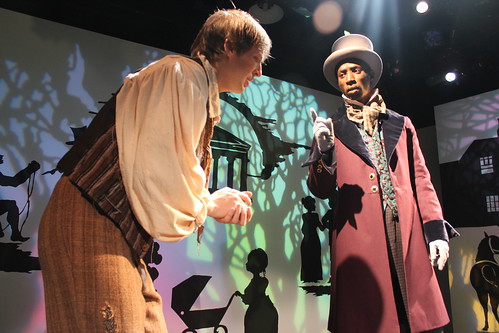
“Pudd’nhead Wilson” opened on Main Campus Feb. 8.
An actor sits in blackface on the stage, strumming a banjo as the audience enters Randall Theater. From this point forward, the audience knows that Temple Theaters’ production of “Pudd’nhead Wilson,” based on Mark Twain’s novel, is no ordinary play.
The play follows the townspeople of Dawson’s Landing, Mo. in the first half of the 19th century. At the onset of the play, Roxy, a slave who is only 1/16th black, secretly switches her infant son, 1/32nd black, with her master’s so that he may live a life of means. Years later, master Tom Driscoll – Roxy’s real son, Chambers – takes Valet de Chambers – the real Tom – as his slave.
Hilarity, sensitivity, shock and horror bring the stage to life in a simple narrative with complex themes.
“Our characters are engaged in racist behavior,” said Doug Wager, Pudd’nhead director, and the theater department’s artistic director who also heads a graduate directing program. “It touches nerves, but it gives actors a platform to live out the origins of those [racial] tensions.”
And live it out they did.
“What I truly enjoyed was the growth and progression that occurred in our very short rehearsal process,” said junior theater major Lia Simon, who plays Roxy.
“I purposely took all African-American studies classes this semester to help me learn more about the history,” Simon said. “I didn’t want to jump into the role with the mentality of ‘I’m a slave.’”
“They didn’t think of themselves as ‘slaves,’ they were human beings who were oppressed and dealt with that the best way they could,” Simon added.
In Wager’s words, “Our racial identity is a fiction of law and custom.” There is much more of a gray area when the skin tone of a character does not matter so much as the clothes she wears and how she speaks.
“[Vocal/dialect coach] Diane Gaary was instrumental in helping me develop the presence and tone of my character,” said senior theater major Alex Fraser, who played Tom Driscoll. “In addition to helping me speak in a solid southern accent.”
The dialect was one of the more challenging concepts for the director and actors to grasp. Chambers, played by junior theater major Scott Gunner, was a white character speaking in a black slave’s dialect.
The N-word was essential to the script and came up a great deal in the play, reminding audience members that the word still carries the same weight that it did 150 years ago.
“It definitely pushes your buttons,” theater department chair Marie Chiment said. “It’s heart-breaking and difficult to watch, but it’s very important.”
“It’s a sensitive topic,” audience member Serena Austin said. “It’s hard to see such truth shown with such humor, because it’s really nothing to laugh at.”
The play’s humor is provided mostly by the character David “Pudd’nhead” Wilson, played by junior theater major Harrison Lampert, who is also a comedian and magician. He interacts with the audience and narrates the story, while simultaneously stepping in as a character.
He is given this nickname because the townspeople think he is slightly off or stupid, when it turns out he is actually none of those things. What the audience first perceives as light comedic relief narration is actually a deep metaphor for those who are overlooked in American society.
“The play reminded me of the idea of segregation, and how badly some people want to change their status, no matter what it is,” audience member Elford Lawrence said. “Theater reminds us of the culture we come from.”
There seems no better setting for “Pudd’nhead Wilson” than in modern-day North Philadelphia, where race and class have a great deal to do with off-campus relations, but little to do with interactions where students are concerned.
There are a number of scenes in the play that easily echo what happens on nearby streets. In one exchange, Tom Driscoll wins a $20 bet. But later, when Roxy begs him for $1, he disgustedly refuses.
In another scene, Judge Howard, played by Jason Klemm, said, “You must look past what you think. That’s what being a judge is all about.”
Ironically, negative judgment is passed in North Philadelphia every day based on superficial assumptions.
“Our perceptions of race and class in America are similar to what they were when Mark Twain wrote the book,” said Wager, in regard to the relevance of the play today.
“[He] played with the subjective of what racism is,” Wager said. “Our racism has affected the economy of capitalism – cheap labor is given to those of the lower class.”
Expressions on the faces of audience members varied as they exited the theater. Some were perplexed, some were content and others seemed amused. The density and confusion about the matter is perhaps what playwright Charles Smith intended when he adapted the novel for the stage in 2002.
In the words of the title character, “None of us really know where we belong.”
Matt Flocco can be reached at matthew.flocco@temple.edu.



Be the first to comment